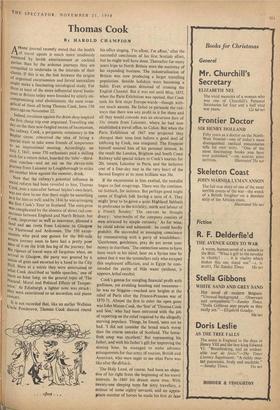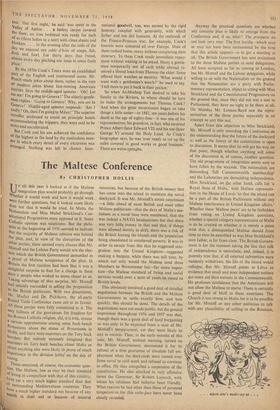Thomas Cook
By HAROLD ,CHAMPION A TRADE journal recently stated that the health of travel agents is much more insidiously menaced by lavish entertainment at cocktail parties than by the arduous journeys they are Compelled to undertake in the interests of their Clients. If this is so, the link between the origins of organised excursionism and fervid teetotalism might make a fascinating sociological study. For three at least of the more influential travel busin- esses in Britain today were founded by utterly un- compromising total abolitionists; the most evan- gelical of them all being Thomas Cook, born 150 Years ago on November 22.
Indeed, revulsion against the dram shop inspired the first cheap trip ever organised. Travelling one day on the then new-fangled means of locomotion, the railway, Cook, a peripatetic missionary in the Baptist cause, conceived the idea of hiring a special train to take some friends of temperance to an inspirational meeting. Accordingly, on July 5, 1841, some 570 enthusiasts paid a shilling each for a return ticket, boarded the 'tubs'—third- class coaches—and set out on the eleven-mile journey from Leicester to Loughborough to strike Yet another blow against the monster, drink.
Now that the railway's potential influence in social reform had been revealed to him, Thomas Cook, ever a man after Samuel Smiles's own heart, was not slow to see that there might be something in it for him as well; and by 1846 he was arranging the first Cook's Tour to Scotland. The enterprise Was complicated by the absence of direct rail con- nections between England and North Britain; but C, ouk, improviser as well as innovator, planned a land and sea route from Leicester to Glasgow via Fleetwood and Ardrossan. The 350 excur- sionists who paid one guinea for the 800-mile return journey seem to have had a pretty poor time of it on the Irish Sea leg of the journey; but the rigours of travel were all forgotten when, on arrival in Glasgow, the party was greeted by a salute of guns and escorted by a band to the City "all. Here at a soiree they were entertained to What Cook described as 'noble speeches,' one of them an hour long, on the general topic of The Natural, Moral and Political Effects of Temper- ance.' At Edinburgh a lighter note was struck : they were entertained to an accordion and piano Concert.
It is not recorded that, like an earlier Wellsian Uncle Ponderevo, Thomas Cook danced round his office singing, `I'm afloat, I'm afloat,' after the successful conclusion of his first Scottish effort, but he might well have done. Thereafter for many years trips to North Britain were the mainstay of his expanding business. The industrialisation of Britain was now producing a larger travelling population. Seaside holidays were becoming a habit. Even artisans dreamed of crossing the English Channel. But it was not until May, 1855, when the Paris Exhibition was opened, that Cook took his first steps Europe-wards—though with- out much success. He failed to persuade the rail- ways that there was any profit in it for them and all they would concede was an excursion fare of 31s. return from Leicester, where he had now established a travel office, to Calais. But when the Paris Exhibition of 1867 was projected they changed their tune (not before a good deal of lobbying by Cook, one imagines). The Emperor himself assured him of his personal interest. In the result the London, Brighton and South Coast Railway sold special tickets to Cook's tourists for 20s. return, Leicester to Paris, and the inclusive cost of a four-day stay in the very heart of the Second Empire at its most brilliant was 36s.
If the excursionist in him exalted, the moralist began to feel misgivings. There was the continen- tal Sabbath, for instance. But perhaps good might .come of English folk having a taste of it. They might 'pray to be. given a quiet Highland Sabbath in preference to the triviality, mirth and labour of a' French Sunday.' The can-can he thought dreary : 'nine-tenths of the company consists of men attracted by simple curiosity.' As for wine, he could advise and admonish : he could hardly prohibit. He succeeded in assuaging conscience by remonstrating with a party of winebibbers: `Gentlemen, gentlemen, pray do not invest your money in diarrhoea.' The connection seems to have been much in his mind; later on a Syrian tour he noted that it was the teetotallers only who escaped this unpleasant affliction, and in Egypt he com- mended the purity of Nile water (without, it appears, lethal results).
Cook's genius for mingling financial profit with godliness, yet avoiding humbug and meanness— he was no Stiggins—reached new heights at the relief of Paris after the Franco-Prussian war of 1870-71. Almost the first to enter the open gates was-John Mason Cook, the 'Son' of 'Thomas Cook and Son,' who had been entrusted with the job of reporting on the relief required by the allegedly starving populace. Things, he found, were not so bad. 'I did not consider the bread much worse than the coarse oatcake of Scotland. The horse- flesh soup was excellent.' But representing his father, and with his father's gift for improving the shining hour, he managed to make advance arrangements for that army of tourists, British and American, who were eager to see what Paris was like after the debtiele.
The Holy Land, of course, had been an objec- tive of his right from the beginning of his-travel interests. In •1869 his dream came true. With twenty-one sleeping tents for sixty travellers, a retinue of some eighty servants, and an appro- priate number of horses he made his first de luxe tour. 'Our first night,' he said 'was spent in the Valley of Ajelon . . . a turkey carpet covered the floor; an iron bedstead was ready for each of us (three ladies to a tent) with clean sheets and blankets . . . in the evening after the toils of the day We enjoyed our table d'hôte of soups, fish, flesh and fowl. For thirty days that lasted, almost every day pitching our tents in some fresh
place,'
By the 1870s Cook's Tours were an established Part of the English and continental scene. Mr. Punch made jokes about them, rather in the vein of modern jokes about fast-moving American tourists. Says the middle-aged spinster : 'Oh! Let me see! I'm going to Geneva( ' The elderly gentle- man replies : 'Going to Geneva! Why, you are in Geneva!' Middle-aged spinster responds: 'Am I really? Oh, then I'm going to Milan !' The superior traveller professed to avoid on principle hotels accommodating the trippers; they were said to be noisy and uncultivated.
But Cook and his son achieved the confidence of the highest in the land by the meticulous man- ner in which every detail of every excursion was arranged. Nothing was left to chance. Inter-
national goodwill, too, was earned by the rigid honesty, coupled with generosity, with which father and son did business. At the outbreak of the Franco-Prussian war, for example, Cook's tourists were scattered all over Europe. Most of them rushed home, many without completing their itinerary. To these Cook made immediate repay- ment without waiting to be asked. Many a gentle- man temporarily out of cash while abroad re- ceived a liberal loan from Thomas the elder. Some offered their watches as security. 'What would 1 want with a gentleman's watch?' he used to say. 'I tell them to put it back in their pocket.'
So when Archbishop Tait desired to take his family to the Riviera, to whom should he turn to make the arrangements but Thomas Cook? And when the great excursionist began to take things a little easier—in 1882, ten years before his death at the age of eighty-four—it was one of his representatives, his grandson, in fact, who escorted Prince Albert (later Edward VII) and his son (later George V) around the Holy Land. As Cook's biographer says, he was 'ever ready to tot up the miles covered in good works or good business.' There are worse epitaphs.















































































 Previous page
Previous page